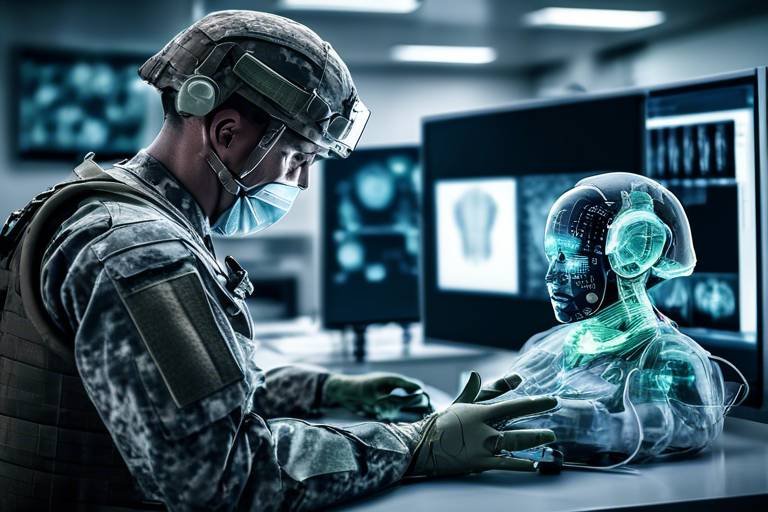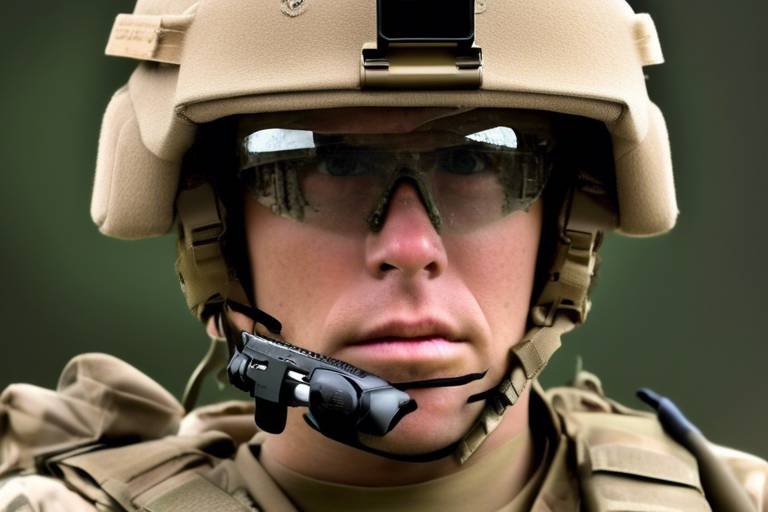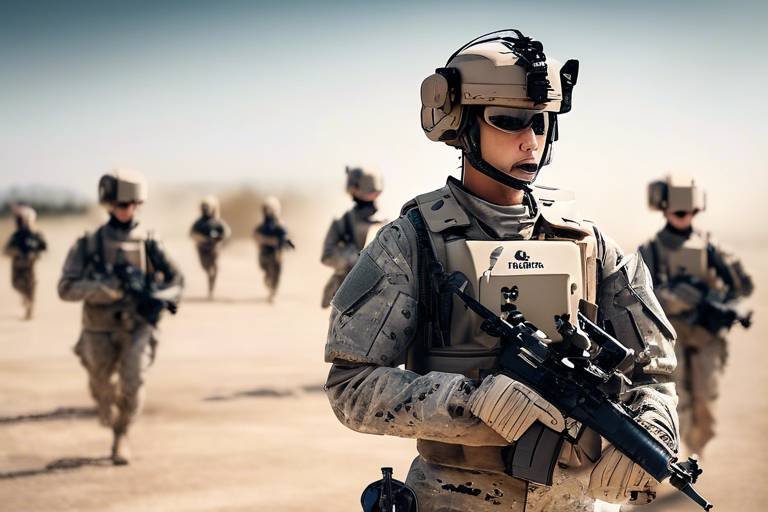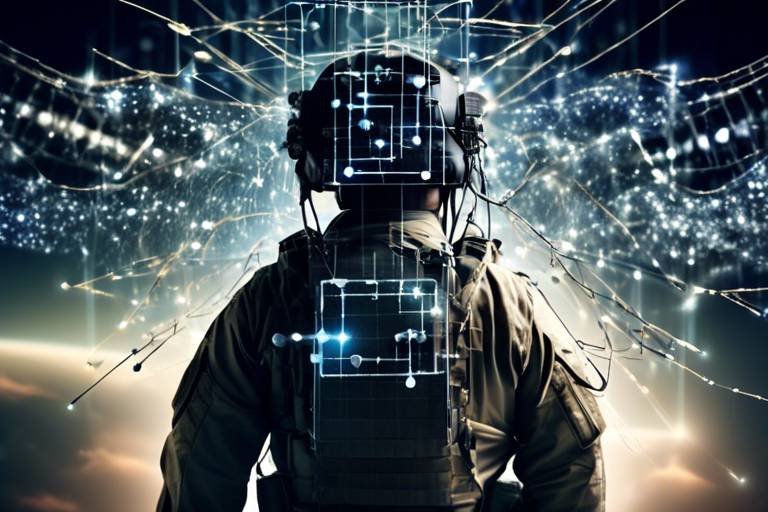The Role of Blockchain in Securing Military Transactions
In an era where technology is advancing at breakneck speed, blockchain has emerged as a game-changer, especially in the realm of military transactions. Imagine a world where every transaction is not only secure but also transparent and efficient. That's the promise of blockchain technology. It acts as a decentralized ledger that records transactions across multiple computers, ensuring that the data is immutable and accessible to authorized parties only. This revolutionary approach is particularly crucial for the military, where the stakes are incredibly high, and the need for secure communication and transaction integrity is paramount.
When we think about military operations, we often envision strategic planning, advanced weaponry, and tactical maneuvers. However, behind the scenes, there is a complex web of transactions that require absolute trust and security. From logistics and supply chain management to personnel records and financial transactions, the military sector is ripe for the integration of blockchain technology. By leveraging the power of blockchain, military organizations can significantly enhance their operational capabilities, ensuring that every piece of data is accurate, secure, and readily available when needed.
But what exactly does this mean for the military? First and foremost, it means a reduction in the risks associated with data breaches and fraud. With traditional systems, unauthorized access can lead to catastrophic consequences, including compromised missions and national security threats. Blockchain's decentralized nature mitigates these risks by distributing data across a network, making it nearly impossible for malicious actors to alter or manipulate the information. This creates a robust environment where trust is built into the system itself.
Moreover, blockchain technology fosters transparency. Every transaction is recorded in a way that is visible to all authorized parties, which not only enhances accountability but also builds a culture of trust within military organizations. The ability to trace and verify transactions in real-time can significantly improve decision-making processes, allowing military leaders to respond swiftly to emerging threats and challenges.
As we delve deeper into the specifics, we will explore how blockchain ensures data integrity and authenticity in military transactions, the role of smart contracts in automating agreements, and how real-time tracking can revolutionize asset management. Additionally, we will analyze the challenges of integrating this cutting-edge technology with existing military systems and highlight real-world case studies that demonstrate its effectiveness.
- What is blockchain technology? Blockchain is a decentralized digital ledger that records transactions across multiple computers securely and transparently.
- How does blockchain enhance military transaction security? It reduces the risk of data breaches and fraud by ensuring that all transactions are immutable and accessible only to authorized parties.
- What are smart contracts? Smart contracts are self-executing contracts with the terms of the agreement directly written into code, automating and securing military agreements.
- Can blockchain integrate with existing military systems? Yes, while there are challenges, solutions are being developed to ensure seamless operation and data exchange.
- What are some real-world examples of blockchain in military use? Various military organizations are experimenting with blockchain for logistics, supply chain management, and secure communications.

Understanding Blockchain Technology
Blockchain technology is often seen as a buzzword in today's tech-driven world, but what exactly is it? At its core, blockchain is a decentralized digital ledger that records transactions across many computers in such a way that the registered transactions cannot be altered retroactively. This means that once a transaction is recorded, it becomes a permanent part of the chain, ensuring that the data remains secure and trustworthy. Imagine a digital notebook that everyone can see, but no one can erase or change the entries. This is the essence of blockchain.
One of the fundamental principles of blockchain is its decentralization. Unlike traditional databases that are controlled by a single entity, blockchain operates on a peer-to-peer network. This decentralization not only enhances security but also promotes transparency. Each participant in the network has access to the entire ledger, which means that everyone can verify the authenticity of transactions without relying on a central authority. In military operations, where trust and data integrity are paramount, this feature becomes incredibly valuable.
Another key aspect of blockchain technology is its use of cryptographic techniques to secure data. Each block in the chain contains a cryptographic hash of the previous block, along with a timestamp and transaction data. This makes it nearly impossible for anyone to alter the information without being detected. If someone tried to change a block, they would not only have to change that block but also every subsequent block, which is a monumental task. Think of it as a series of interconnected chains; if one link is tampered with, the entire chain is compromised.
To illustrate how blockchain operates, let’s break it down into a few simple components:
- Blocks: Each block contains a collection of transactions. When a block is filled, it is added to the chain.
- Nodes: These are the computers that participate in the blockchain network, verifying and recording transactions.
- Consensus Mechanisms: These are protocols that ensure all nodes agree on the validity of transactions before they are added to the blockchain, maintaining the integrity of the data.
In summary, blockchain technology is revolutionizing the way we think about data security and transaction integrity. Its decentralized nature, combined with robust cryptographic security, provides a solid foundation for applications across various sectors, including the military. As we delve deeper into the implications of blockchain for military transactions, it becomes clear that this technology is not just a passing trend but a transformative force that can enhance operational efficiency and security.
- What is blockchain technology? Blockchain is a decentralized digital ledger that records transactions securely and transparently across multiple computers.
- How does blockchain ensure security? Blockchain uses cryptographic techniques to secure data, making it nearly impossible to alter information without detection.
- What are the benefits of using blockchain in military transactions? The benefits include enhanced security, transparency, data integrity, and operational efficiency.
- Can blockchain be integrated with existing military systems? Yes, while there are challenges, solutions are being developed to ensure seamless integration with current systems.

Importance of Security in Military Transactions
In the realm of military operations, the importance of security in transactions cannot be overstated. Imagine a world where sensitive information could be intercepted or altered by malicious actors—this is a nightmare scenario for any defense organization. The stakes are incredibly high; a single data breach can compromise national security and put lives at risk. Therefore, ensuring the integrity and confidentiality of military transactions is paramount. With the increasing digitization of military processes, the risks associated with data breaches, fraud, and unauthorized access have grown exponentially. Cybersecurity threats are more sophisticated than ever, making it essential for military organizations to adopt robust security measures.
The implications of inadequate security in military transactions can be catastrophic. For instance, unauthorized access to sensitive data could lead to espionage, sabotage, or even the loss of military assets. The military must maintain a strong defense not just against physical threats but also against digital ones. A breach could potentially provide adversaries with critical information about troop movements, operational strategies, or advanced technologies. Therefore, the military must prioritize security in all transactions to protect its assets and maintain operational effectiveness.
Moreover, the complexity of military transactions often involves multiple stakeholders, including government agencies, contractors, and allied nations. This multi-layered interaction increases the potential for security vulnerabilities. Each participant in the transaction represents a possible entry point for cyber threats. To mitigate these risks, it is crucial to establish a secure framework that ensures all parties can trust the information exchanged. Blockchain technology emerges as a powerful tool in this context, offering a decentralized and tamper-proof ledger that enhances the security of military transactions.
By employing blockchain, military organizations can ensure that every transaction is recorded in a secure manner, making it nearly impossible for any unauthorized party to alter the data without detection. This level of security is essential not only for protecting sensitive information but also for fostering trust among all stakeholders involved. The transparency provided by blockchain means that all parties can verify the authenticity of the data, reducing the risk of fraud and enhancing overall operational efficiency.
As we delve deeper into the importance of security in military transactions, it's also essential to recognize the role of regulatory compliance. Military organizations are subject to stringent regulations regarding data protection and privacy. Failing to comply with these regulations can lead to severe penalties and damage to reputation. Therefore, implementing secure transaction methods that align with these regulations is not just a best practice; it's a necessity. Blockchain can help organizations meet these compliance requirements by providing an immutable record of all transactions, which can be easily audited.
In conclusion, the security of military transactions is a critical aspect of national defense. With the increasing threats posed by cyber adversaries, military organizations must adopt innovative solutions to safeguard their operations. Blockchain technology stands out as a promising avenue for enhancing security, ensuring data integrity, and fostering trust among stakeholders. As we move forward, the integration of such technologies will be vital in creating a resilient defense framework capable of withstanding the challenges of the digital age.
- Why is security crucial in military transactions? Security is essential to protect sensitive information from breaches that could compromise national security and operational effectiveness.
- How does blockchain enhance security in military transactions? Blockchain offers a decentralized and tamper-proof ledger, ensuring data integrity and authenticity while reducing the risk of fraud.
- What are the risks associated with inadequate security? Inadequate security can lead to unauthorized access, espionage, sabotage, and the potential loss of military assets.
- How can military organizations ensure compliance with regulations? By implementing secure transaction methods like blockchain, military organizations can create immutable records that align with regulatory requirements.

Data Integrity and Authenticity
In the world of military transactions, data integrity and authenticity are not just buzzwords; they are the backbone of operational success and national security. Imagine a scenario where critical data is altered or tampered with—this could lead to disastrous consequences, not only in terms of mission failure but also in jeopardizing the safety of personnel and assets. Blockchain technology steps in as a guardian of trust, ensuring that all data exchanged in military operations remains untouched and verifiable.
At its core, blockchain operates as a decentralized ledger, meaning that no single entity has control over the entire system. This decentralization is crucial for military applications, as it eliminates the risk of a single point of failure. Each transaction is recorded in a block and linked to previous blocks, creating an immutable chain of data. Once information is entered into the blockchain, it becomes nearly impossible to alter without the consensus of the network. This feature is paramount for maintaining the integrity of sensitive military data, as it guarantees that any changes are transparent and traceable.
Furthermore, blockchain employs cryptographic techniques to ensure that data is not only secure but also authentic. Each transaction is encrypted, and only authorized personnel can access the information. This level of security is vital in military contexts, where unauthorized access can lead to espionage or sabotage. By utilizing blockchain, military organizations can establish a robust framework for authenticating data, allowing them to verify the source and integrity of the information quickly.
To illustrate the significance of data integrity and authenticity in military transactions, consider the following aspects:
- Prevention of Tampering: Blockchain's immutable nature prevents unauthorized alterations, ensuring that all parties involved can trust the information exchanged.
- Enhanced Accountability: With every transaction recorded on a public ledger, accountability is heightened. Military personnel can trace back any changes or discrepancies to their source.
- Real-time Verification: The ability to verify data in real-time means that military leaders can make informed decisions based on the most accurate and up-to-date information available.
In summary, the integration of blockchain technology into military transactions represents a significant leap forward in ensuring data integrity and authenticity. By providing a secure, transparent, and tamper-proof environment for data exchange, blockchain not only enhances operational efficiency but also fortifies national security. As military organizations continue to embrace this innovative technology, we can expect to see a transformation in how sensitive information is managed, ultimately leading to more successful missions and safer operations.
Q: How does blockchain ensure data integrity in military transactions?
A: Blockchain ensures data integrity by creating an immutable record of transactions that cannot be altered without consensus from the network. Each transaction is linked to previous ones, forming a secure chain of data.
Q: Can blockchain technology prevent unauthorized access to military data?
A: Yes, blockchain employs cryptographic techniques that secure data and restrict access to authorized personnel only, significantly reducing the risk of unauthorized access.
Q: What role do smart contracts play in maintaining data authenticity?
A: Smart contracts automate agreements and transactions, ensuring that conditions are met before any data is exchanged, which helps maintain data authenticity and reduces the potential for disputes.

Smart Contracts in Defense
In the rapidly evolving landscape of military operations, smart contracts are emerging as a game-changer, revolutionizing how agreements and transactions are executed. But what exactly are smart contracts? Picture them as self-executing contracts with the terms of the agreement directly written into code. This means that once the conditions are met, the contract automatically executes, eliminating the need for intermediaries. Imagine a world where military agreements are not only secure but also executed flawlessly without human error or delay.
The integration of smart contracts in defense operations can significantly enhance operational efficiency and reduce the potential for disputes. For instance, consider a scenario where military supplies are procured. Traditionally, this process can be fraught with delays and disputes over terms. However, with smart contracts, once the delivery conditions are met—like the arrival of supplies at a designated location—the payment is automatically released. This not only speeds up the process but also ensures that all parties adhere to the agreed terms.
Moreover, the transparency offered by smart contracts is a crucial benefit in military transactions. Each transaction is recorded on the blockchain, providing an immutable record that can be audited at any time. This transparency helps to build trust among parties involved, as they can verify that the terms are being followed without the risk of tampering. In a field where trust is paramount, this aspect cannot be overstated.
Furthermore, smart contracts can be programmed to include specific conditions that must be met before execution. For example, if a military operation requires the coordination of multiple units, a smart contract can ensure that all necessary approvals are in place before any action is taken. This conditional execution acts as a safeguard against unauthorized actions, thereby enhancing national security.
As we look towards the future, the potential applications of smart contracts in defense are virtually limitless. From automating procurement processes to ensuring compliance with international treaties, the ability to create self-executing agreements could transform the military landscape. However, it’s essential to consider the challenges that come with this technology. The integration of smart contracts into existing military frameworks will require careful planning and collaboration between tech developers and military strategists.
In conclusion, smart contracts represent a significant advancement in securing military transactions. By automating processes, enhancing transparency, and ensuring compliance, they are set to redefine how military agreements are handled. As defense organizations continue to explore the potential of blockchain technology, smart contracts will likely play a pivotal role in shaping the future of military operations.
- What are smart contracts? Smart contracts are self-executing contracts with the terms directly written into code, which automatically execute once conditions are met.
- How do smart contracts enhance military operations? They streamline processes, reduce disputes, and provide transparency, ensuring that all parties adhere to agreed terms.
- Can smart contracts improve trust in military transactions? Yes, the transparency and immutability of blockchain technology help build trust among all parties involved.
- What challenges exist in implementing smart contracts in defense? Integration with existing systems, ensuring compliance, and the need for collaboration between tech and military experts are key challenges.

Real-time Tracking and Monitoring
In today's fast-paced military landscape, of assets and transactions is not just a luxury; it's a necessity. Imagine being able to pinpoint the exact location of a military vehicle, aircraft, or shipment at any given moment. This level of visibility can significantly enhance operational efficiency and decision-making processes. Blockchain technology plays a pivotal role in making this a reality, providing a decentralized and immutable ledger that records every transaction and movement.
One of the most compelling features of blockchain is its ability to offer transparency without sacrificing security. Each transaction is recorded in a block and linked to the previous one, creating a chronological chain that is visible to all authorized parties. This means that military officials can monitor the status of supplies, equipment, and personnel in real time, ensuring that resources are allocated efficiently and effectively. Furthermore, because the data is stored across a network of computers rather than a single server, it becomes nearly impossible for malicious actors to alter or erase information.
Consider a scenario where a military convoy is transporting sensitive materials. With traditional tracking methods, there is always the risk of human error or data manipulation. However, with blockchain, every movement is automatically logged and verified, providing an unalterable record that can be audited at any time. This not only boosts accountability but also ensures that any discrepancies can be quickly identified and addressed.
Moreover, the integration of Internet of Things (IoT) devices with blockchain technology can further enhance real-time tracking capabilities. For instance, sensors embedded in military equipment can continuously transmit data about their condition and location. This information can be securely recorded on the blockchain, allowing for proactive maintenance and reducing the likelihood of equipment failures during critical operations.
To illustrate the impact of real-time tracking and monitoring in the military, let's take a look at a few key benefits:
- Enhanced Accountability: Every transaction and movement is recorded, making it easy to trace the history of military assets.
- Improved Decision-Making: Real-time data allows military leaders to make informed decisions quickly, adapting to changing circumstances on the ground.
- Reduced Fraud and Theft: With secure, transparent records, the risk of unauthorized access and manipulation is significantly minimized.
In conclusion, the ability to track and monitor military transactions and assets in real time is revolutionizing the defense sector. Blockchain technology not only facilitates this process but also enhances security, transparency, and operational efficiency. As military organizations continue to adopt these innovations, we can expect a more streamlined and effective approach to defense operations, ultimately leading to a stronger national security framework.
- What is blockchain technology? Blockchain is a decentralized digital ledger that records transactions across multiple computers, ensuring that the data is secure and cannot be altered retroactively.
- How does blockchain enhance security in military transactions? By providing an immutable record of transactions and enabling real-time tracking, blockchain reduces the risks of fraud, data breaches, and unauthorized access.
- Can blockchain be integrated with existing military systems? Yes, while there are challenges, many military organizations are actively working on solutions to integrate blockchain technology with their current systems for seamless operation.
- What are smart contracts? Smart contracts are self-executing contracts with the terms of the agreement directly written into code, allowing for automated and secure execution of military agreements.

Interoperability with Existing Systems
When it comes to integrating blockchain technology within military operations, one of the most pressing challenges is achieving interoperability with existing systems. Imagine trying to fit a high-tech puzzle piece into a traditional jigsaw; if the pieces don’t align, the entire picture remains incomplete. This analogy perfectly encapsulates the situation faced by military organizations as they strive to incorporate blockchain into their established frameworks. The military sector is characterized by a myriad of legacy systems, each with its own protocols, data formats, and security measures. Therefore, ensuring that blockchain can seamlessly communicate and function alongside these systems is crucial for its successful implementation.
One of the primary hurdles is the variety of platforms currently in use. Different branches of the military may utilize distinct software and hardware solutions, which can complicate the integration process. For instance, logistics systems, personnel management databases, and operational command software all operate on different technical standards. To address this, military organizations must engage in thorough planning and collaboration with technology providers to develop customized solutions that facilitate smooth data exchange and operational continuity.
Furthermore, the integration process must prioritize data security. Military transactions often involve sensitive information that, if compromised, could have dire consequences. Therefore, any blockchain solution must not only be compatible with existing systems but also enhance their security measures. This is where the concept of hybrid systems comes into play, where blockchain can be implemented alongside traditional systems, gradually phasing in decentralized technology while maintaining robust security protocols.
To navigate these complexities, military organizations might consider employing modular architectures. This approach allows for the gradual integration of blockchain technology—starting with pilot projects that can be tested and refined before a full-scale rollout. By doing so, they can identify potential issues early on and adjust their strategies accordingly. Moreover, training personnel to understand both the new blockchain systems and the legacy systems is essential to ensure a smooth transition and operational efficiency.
In summary, while the path to achieving interoperability with existing systems may be fraught with challenges, it is not insurmountable. By focusing on collaboration, security, and gradual integration, military organizations can harness the power of blockchain technology to enhance their operations without sacrificing the integrity of their established systems. The future of military transactions could very well hinge on this delicate balance, paving the way for a more secure and efficient defense landscape.
- What is blockchain interoperability? Blockchain interoperability refers to the ability of different blockchain systems and existing technologies to communicate and operate together seamlessly.
- Why is interoperability important in the military? Interoperability is crucial in the military to ensure that new technologies can work alongside legacy systems, enhancing operational efficiency and data security.
- What challenges exist in integrating blockchain with military systems? Challenges include varying technical standards, security concerns, and the complexity of existing systems that must be navigated during integration.
- How can military organizations ensure successful integration? By focusing on collaboration with technology providers, implementing modular architectures, and providing adequate training for personnel.

Case Studies of Blockchain in Military Use
As the military landscape evolves, so does the need for innovative solutions that enhance security and operational efficiency. Blockchain technology has emerged as a game changer, with numerous military organizations around the globe recognizing its potential. Let’s delve into some fascinating case studies that illustrate how blockchain is being utilized to secure military transactions and streamline operations.
One notable example comes from the United States Department of Defense (DoD), which has been exploring blockchain applications for supply chain management. The DoD identified that traditional supply chains are vulnerable to fraud and inefficiencies. By implementing blockchain, they aimed to create a transparent and immutable ledger that tracks every component from procurement to delivery. This initiative not only improves accountability but also enhances trust among suppliers and contractors. The results have been promising, leading to reduced costs and increased operational resilience.
Another compelling case is the collaboration between NATO and various tech companies to develop a blockchain-based system for secure communication. This initiative focuses on ensuring that sensitive information shared between member nations remains confidential and tamper-proof. By leveraging blockchain’s decentralized nature, NATO aims to mitigate risks associated with centralized data storage, which can be more susceptible to cyberattacks. The pilot program has shown great potential, with initial tests demonstrating increased data integrity and security.
In Australia, the military has partnered with a blockchain startup to enhance the tracking of military assets. The project uses blockchain to create a digital twin of each asset, allowing real-time monitoring of their status and location. This capability is crucial for logistics and operational planning, as it ensures that commanders have accurate and up-to-date information at their fingertips. The Australian Defense Force has reported significant improvements in responsiveness and accountability since implementing this system.
These case studies highlight the transformative impact of blockchain technology in military applications. However, they also underscore the importance of collaboration between military organizations and tech innovators. By working together, they can develop tailored solutions that address specific challenges in the defense sector.
Collaboration is key to the successful implementation of blockchain in military contexts. Partnerships between military organizations and blockchain companies are becoming increasingly common, as both parties recognize the value of shared expertise. For instance, the U.S. Army has engaged with various blockchain firms to explore the potential for smart contracts in procurement processes. These contracts can automate and secure transactions, significantly reducing the potential for disputes and enhancing efficiency.
Moreover, international collaborations are also on the rise, with countries sharing insights and best practices regarding blockchain applications in defense. This collective effort not only accelerates the adoption of technology but also fosters a culture of innovation within the military sector. As these partnerships continue to grow, we can expect to see even more groundbreaking advancements in the use of blockchain technology.
Looking ahead, the future of blockchain in military applications is bright. As technology continues to evolve, we can anticipate advancements that will further enhance security and efficiency. Emerging trends include the integration of artificial intelligence with blockchain, which could lead to smarter decision-making processes in defense operations. Additionally, the potential for quantum computing poses both challenges and opportunities for blockchain security, necessitating ongoing research and adaptation.
In conclusion, the case studies presented here demonstrate that blockchain technology is not just a buzzword but a practical tool that can revolutionize military transactions. By enhancing security, ensuring data integrity, and improving operational efficiency, blockchain is paving the way for a more secure and responsive defense sector.
- What is blockchain technology? Blockchain is a decentralized digital ledger that records transactions across multiple computers, ensuring that the recorded information cannot be altered retroactively.
- How does blockchain enhance security in military transactions? By providing a transparent and immutable record of transactions, blockchain reduces the risk of fraud and unauthorized access, thereby enhancing overall security.
- What are smart contracts? Smart contracts are self-executing contracts with the terms of the agreement directly written into code, allowing for automated and secure transactions without the need for intermediaries.
- Can blockchain be integrated with existing military systems? Yes, while there are challenges to integration, solutions are being developed to ensure seamless operation and data exchange across platforms.

Partnerships and Collaborations
In the rapidly evolving landscape of military technology, have become pivotal in harnessing the potential of blockchain. Military organizations are increasingly recognizing that to effectively integrate blockchain solutions, they must work hand-in-hand with technology firms that specialize in this innovative field. These collaborations not only facilitate the transfer of knowledge but also ensure that the solutions developed are tailored to meet the unique needs of defense operations.
One of the standout examples of this synergy is the collaboration between the U.S. Department of Defense (DoD) and various blockchain startups. By pooling resources and expertise, these partnerships aim to create robust platforms that enhance security and efficiency in military transactions. For instance, the DoD has engaged with companies like IBM and Guardtime to explore blockchain applications that can secure supply chains and manage critical data. This collaboration is akin to a well-coordinated military operation where each party plays a crucial role in achieving a common objective.
Moreover, these partnerships often extend beyond just technology firms. Collaborations with academic institutions are also on the rise, where researchers and military strategists come together to explore the theoretical and practical implications of blockchain in defense. Such alliances foster an environment of innovation, allowing for the testing of new ideas and concepts in controlled settings before they are deployed in real-world scenarios.
To illustrate the impact of these partnerships, consider the following table that highlights notable collaborations and their outcomes:
| Partnership | Objective | Outcome |
|---|---|---|
| U.S. DoD & IBM | Supply Chain Security | Enhanced tracking and verification of military supplies |
| Guardtime & NATO | Data Integrity | Improved trust in data exchange between member nations |
| MIT & U.S. Army | Research on Blockchain Applications | Innovative solutions for operational efficiency |
Additionally, the military's approach to blockchain partnerships is characterized by a willingness to experiment and adapt. These collaborations are not merely transactional; they represent a commitment to long-term strategic goals. By investing in blockchain technologies through partnerships, military organizations can stay ahead of potential threats, ensuring that their operations remain secure and efficient.
As we look to the future, the importance of these collaborations cannot be overstated. The defense sector is facing unprecedented challenges, from cyber threats to the need for rapid data processing. By fostering strong partnerships with blockchain experts, military organizations can develop solutions that are not only effective but also resilient against evolving threats. In essence, these collaborations are the backbone of a secure and efficient military future, paving the way for innovations that could redefine how military transactions are conducted.
- What is the role of blockchain in military transactions?
Blockchain enhances security, transparency, and efficiency, making military transactions more reliable. - How do partnerships enhance blockchain implementation?
Collaborations with tech firms and academic institutions provide expertise and tailored solutions for military needs. - What are the benefits of using smart contracts in defense?
Smart contracts automate agreements, reduce disputes, and improve operational efficiency. - Can blockchain integrate with existing military systems?
Yes, with careful planning and collaboration, blockchain can be integrated into current systems for seamless operation.

Future Trends and Developments
As we look towards the horizon of military operations and technology, the integration of blockchain is not just a trend; it's a revolution waiting to unfold. The future of blockchain in military applications is brimming with potential, promising to reshape how defense organizations operate. Imagine a world where every transaction, every piece of data, and every asset is tracked with unparalleled accuracy and security. This is not science fiction; it's the trajectory we are on.
One of the most exciting developments on the horizon is the emergence of advanced encryption techniques within blockchain systems. As cyber threats evolve, the military must stay one step ahead. Future blockchain implementations are expected to incorporate quantum-resistant algorithms, ensuring that even the most sophisticated cyber attacks cannot compromise sensitive military data. This is akin to building a fortress that can withstand not just the current siege but also future invasions.
Moreover, the concept of interoperability will gain significant traction. Military organizations worldwide operate on a patchwork of systems and technologies, often leading to inefficiencies and communication breakdowns. Future blockchain solutions will focus on creating seamless integration with existing military infrastructures. This means that data from various platforms can be securely shared and accessed in real-time, much like a well-orchestrated symphony where every instrument harmonizes perfectly.
Another noteworthy trend is the proliferation of artificial intelligence (AI) in conjunction with blockchain. As AI continues to evolve, its integration with blockchain technology will enhance decision-making processes in military operations. For instance, AI algorithms can analyze vast amounts of data stored on a blockchain to identify patterns and anomalies, providing military leaders with insights that were previously unattainable. This partnership can be likened to having a super-intelligent advisor who can sift through mountains of information and highlight what truly matters.
Furthermore, we can expect to see a rise in collaborative platforms that leverage blockchain for joint military operations between allied nations. These platforms will enable secure information sharing and joint decision-making, enhancing global defense strategies. Just like a team of superheroes pooling their strengths to combat a common enemy, military alliances will benefit from the transparency and trust that blockchain provides.
Lastly, the future will likely see an increased focus on sustainability within military operations, with blockchain playing a pivotal role. By tracking supply chains and resource usage, defense organizations can optimize their operations to reduce waste and enhance efficiency. This shift towards sustainability is not just a trend; it represents a fundamental change in how militaries view their environmental responsibilities.
In conclusion, the future of blockchain in military applications is bright and full of promise. With advancements in encryption, interoperability, AI integration, collaborative platforms, and sustainability, we are on the brink of a transformative era in defense technology. The military's embrace of blockchain will not only enhance operational efficiency but will also ensure that national security remains robust in the face of evolving threats. Buckle up, because the revolution is just beginning!
- What is blockchain technology? Blockchain is a decentralized digital ledger that securely records transactions across multiple computers, ensuring data integrity and transparency.
- How does blockchain enhance military security? By providing a tamper-proof record of transactions, blockchain enhances data integrity, reduces fraud, and mitigates unauthorized access.
- What are smart contracts? Smart contracts are self-executing contracts with the terms of the agreement directly written into code, enabling automated and secure military agreements.
- Can blockchain integrate with existing military systems? Yes, future developments focus on ensuring blockchain solutions can seamlessly integrate with current military infrastructures for improved data exchange.
- What role will AI play in blockchain for military use? AI can analyze blockchain data to provide insights and enhance decision-making processes, making military operations more efficient.
Frequently Asked Questions
- What is blockchain technology?
Blockchain technology is a decentralized digital ledger that securely records transactions across multiple computers. This ensures that the recorded information cannot be altered retroactively, providing a high level of security and transparency.
- How does blockchain enhance security in military transactions?
Blockchain enhances security by ensuring data integrity and authenticity. Each transaction is encrypted and linked to the previous one, making it nearly impossible for unauthorized parties to tamper with the data.
- What are smart contracts, and how do they work in defense?
Smart contracts are self-executing contracts with the terms of the agreement directly written into code. In defense, they automate and secure military agreements, reducing the potential for disputes and increasing operational efficiency.
- Can blockchain be integrated with existing military systems?
Yes, blockchain can be integrated with existing military systems. However, this requires addressing challenges related to interoperability and ensuring seamless data exchange across various platforms.
- Are there real-world examples of blockchain being used in the military?
Absolutely! Several military organizations have successfully implemented blockchain technology to enhance transaction security and operational efficiency, showcasing its potential in real-world scenarios.
- What are the future trends for blockchain in military applications?
The future of blockchain in military applications looks promising, with potential advancements in technology and evolving defense strategies. This could lead to more secure, efficient, and transparent military operations.
- How does blockchain ensure data integrity?
Blockchain ensures data integrity through its cryptographic security measures and decentralized nature. Once data is recorded on the blockchain, it cannot be altered without consensus from the majority of the network participants.
- What are the implications of data breaches in military transactions?
Data breaches in military transactions can have severe implications, including compromised national security, loss of sensitive information, and diminished trust in military operations. That's why enhancing security is crucial.



















